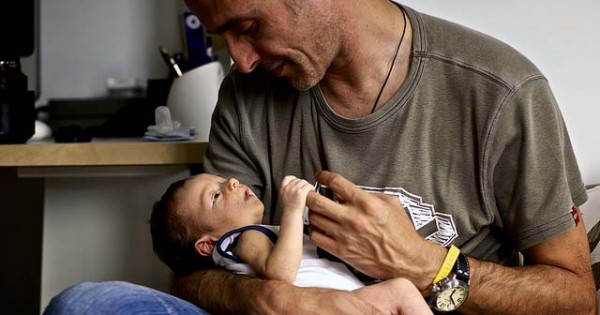
Leafing through The Science of Parenting (2006) by Margot Sunderland, I count 78 photographs of mothers hugging, nursing, or sleeping with a child. By contrast, I find only 22 photos of fathers engaged with a child. Pictures in which both mother and father interact with one or more child total two. No same-sex parents are depicted.
Even given the societal changes in the nine years since the book appeared, the discrepancy in the portrayal of parenting is no surprise. Although 71 percent of mothers in the United States work outside the home, according to a recent Pew Research Center poll, mothers still devote twice as many hours per week—14—to childcare than do fathers.
But fathers are important in parenting, says Catherine Panter-Brick, a professor of anthropology, health and global affairs at Yale University. “They matter for their [child’s] social, emotional, and physical well-being; they matter for their educational outcomes; they matter for their life satisfaction, for their capacity for empathy,” Panter-Brick said in an interview with Yale’s MacMillan Center for International and Area Studies. They also matter to mothers, in helping to create gender equity in the home; and they matter for global citizenship, “because the way that a child has been raised influences the way that child raises … children.”
Panter-Brick has conducted research on street children, famine-stricken households, and refugees in Afghanistan, Ethiopia, Nepal, and Niger. “I work in conflict areas,” she wrote to me via email, “so I am particularly interested in how fathers and mothers can raise a new generation of children with a disposition to peace and not a disposition to violence.”
To this end, she and her Yale colleagues, together with Adrienne Burgess, head of research at the Fatherhood Institute in England, recently conducted a global review of 199 parenting interventions or studies that include fathers. The programs in their survey, implemented in 20 countries from Australia to the Ukraine, are offered in settings ranging from child health centers to jails. They include Écoles des Maris (Schools for Husbands) in Niger, in which newly married men are tutored in the skills of being fathers; and Brazil’s Instituto Promundo program, which offers workshops to fathers in Rio de Janeiro’s favelas, supporting and encouraging them to turn away from domestic violence toward an empathic family life.
Most parenting programs are “heavily gender biased,” in favor of mothers—perhaps because it is assumed that moms are more deeply connected to their children than dads. Even though fathers are, in Panter-Brick’s words, “sometimes sidelined, and sometimes undermined,” studies show that fathers sustain the same levels of bonding and nurturing hormones when they cuddle a baby as mothers do. Within 15 minutes of holding an infant, men experience a rise in oxytocin, a hormone associated with tolerance and trust, and in prolactin, the hormone that stimulates the breasts to produce milk. “The more experienced the father is as a caregiver, the quicker and more pronounced are these hormonal changes,” according to research cited by the Fatherhood Institute.
The biochemical changes, Panter-Brick explained in the MacMillan interview, prime men’s brains toward empathy and social relationships “rather than aggression, fear, and punishment.” Rewarding men in their efforts to nurture children is vital, because parental and social skills—or a disposition to violence—cascade from one generation to the next. “The way we raise our children will matter for health and social development,” she says. “The big new idea, the bold idea, is that the way that we raise our children will matter for peace-building.”


